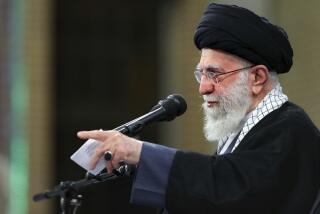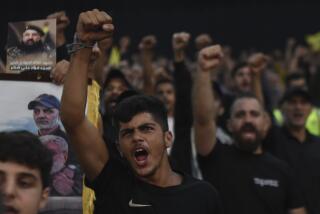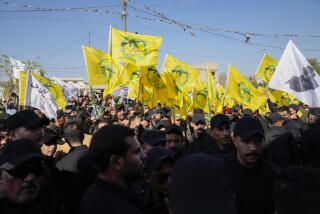Iranian general killed while traveling from Syria to Lebanon
TEHRAN — Top political and security officials in Iran mourned Thursday for a general in the nation’s Revolutionary Guard reportedly slain this week while traveling from Syria to Lebanon.
The assassination of Gen. Hassan Shateri was the strongest public indication to date that senior Iranian military commanders have been dispatched to war-ravaged Syria to assist the embattled government of President Bashar Assad.
Details about the general’s death remained sketchy Thursday, two days after he was reported slain en route from Damascus, the Syrian capital, to Beirut. Iranian authorities were mum on whether he was killed on Syrian or Lebanese soil.
If Shateri’s death occurred in Syria, as is widely suspected, the general would be the first senior Iranian commander publicly known to have been killed in the Syrian conflict.
Iranian news reports blamed “Israeli agents” but provided no further details. Iran often accuses Syrian rebels of being pawns of Israel and the West.
There were no definitive reports of Syrian opposition forces having carried out the assassination. The rebels often allege that units from Iran and Hezbollah, the Lebanese militant group allied with Tehran, assist Syrian government forces.
The opposition and its allies, including the United States, have accused Iran of propping up Assad’s regime with military, logistical and financial aid. Iran has downplayed its military role in supporting Assad, its close ally, as he confronts a rebellion against his rule.
Iranian news reports referred to the general as an “engineer” and emphasized his role in reconstruction of war-battered zones of Lebanon and Afghanistan. There was no public mention of any military or strategic duties.
Among those mourning at a public funeral in Tehran were Foreign Minister Ali Akbar Salehi, high-ranking clerics and the chiefs of the Revolutionary Guard and its foreign arm, the Quds Force.
Gen. Qasim Sulaimani, who heads the Quds Force, personally notified the general’s family of his death, Iranian news reports said, a fact that seemed to confirm the slain general’s reported link to the shadowy force.
The general’s death again highlights Iran’s support for both Syria and Hezbollah, allies in what Tehran calls the “axis of resistance” to Israel and the West.
In Syria, meanwhile, rebels reportedly captured most of an eastern oil city, Shaddada, after a fierce three-day battle that left scores dead, according to the Syrian Observatory for Human Rights, a Britain-based pro-opposition group. The observatory reported that the dead included more than 100 security personnel, dozens of civilian oil workers, and 30 fighters with Al Nusra Front, an Islamist rebel faction that has been labeled a terrorist group by Washington.
In the battle-scarred northern city of Aleppo, clashes continued for at least a third day near the perimeter of the besieged international airport and adjacent military airfield. Fighting also erupted in the heart of the Old City.
The almost 2-year-old Syrian conflict has resulted in more than 60,000 deaths, according to the United Nations, while creating more than 1 million refugees, forcing 2 million other Syrians out of their homes and leaving much of the nation’s infrastructure a wreck and its economy in ruins.
Times staff writer McDonnell reported from Beirut and special correspondent Mostaghim from Tehran. Staff writer Raja Abdulrahim in Beirut contributed to this report.
More to Read
Sign up for Essential California
The most important California stories and recommendations in your inbox every morning.
You may occasionally receive promotional content from the Los Angeles Times.









